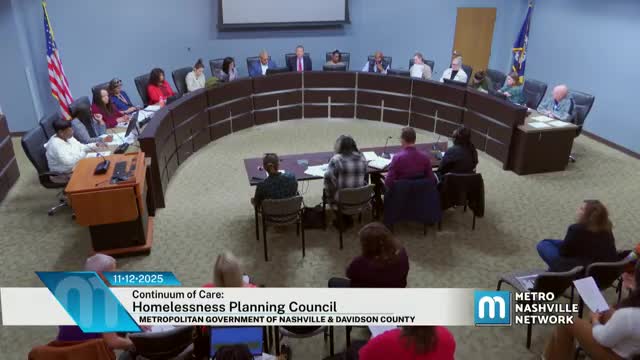OHS defends metro rapid response pilot as council demands clearer safeguards and review
Get AI-powered insights, summaries, and transcripts
Subscribe
Summary
Director Calvin told the Homelessness Planning Council the metro rapid response funding pilot aimed to increase local capacity and provide short-term subsidies; members and public commenters pressed for transparency, coordinated-entry safeguards and a formal after-action review.
Director Calvin, speaking for OHS, defended a recently launched metro rapid response funding (MRRF) pilot on Nov. 12 at the Homelessness Planning Council meeting, saying the locally controlled dollars were intended to expand capacity and provide rapid bridge assistance when shelters reached capacity.
Calvin said the pilot housed eight families and that most received ongoing subsidies, while two households achieved stability without further subsidy. He described a planned step-down schedule that reduced municipal payments over time and said case managers reassess households every three months to evaluate income progress, budgeting and linkage to longer-term subsidies.
The discussion followed sharp public comments questioning whether MRRF payments were administered with sufficient transparency and oversight. Mike Lacey, a public commenter, said residents worry MRRF could operate "off the books" without contracts or a formal process; he asked whether the program would have a contract and public accountability.
Calvin responded that MRRF is distinct from prior bridge funding and from CLC funds: CLC dollars carry prescriptive restrictions, while the local MRRF was designed with flexibility to "increase total capacity" and provide relief across metro departments and council districts. He said OHS consulted HUD technical assistance providers and sister cities when designing the pilot and that the office is preparing memoranda of understanding and Metro Legal review for agencies accessing MRRF.
Council members pressed how MRRF interacts with the coordinated entry (CE) process and whether placements "leapfrog" those waiting in HMIS queues. Jamie Villegas and others asked whether households served by MRRF were routed through CE. Calvin said the office prioritizes long-stayers and high-acuity clients where possible and noted the fund is intended to extend capacity when shelters are full; he said some placements reflected commitments OHS honored from a former employee and that most recipients received ongoing subsidies through existing programs.
Members recommended an after-action "hot wash" to capture lessons learned, answer transparency questions and review program design. Multiple council members also urged clear documentation of MOUs, legal review, and a public accounting of how MRRF dollars are deployed. The council did not take formal action on the pilot at the meeting.
The chair said OHS has acknowledged corrective actions related to invoices and furniture vouchers and welcomed suggestions for improved oversight and reporting going forward.
